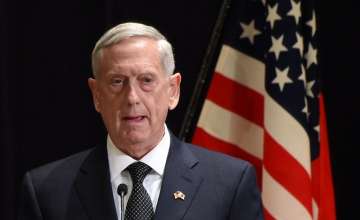US Defence Secretary James Mattis on Friday accused China of intimidation and coercion because of its military build-up and deployment of high-end weapons in the disputed waters of South China Sea.
Speaking at a high-profile security summit in Singapore, Mattis said Beijing had deployed a range of military hardware including anti-ship missiles, surface-to-air missiles and electronic jammers across the South China Sea, where it has built artificial islands and other maritime features into hardened military facilities. He said that Beijing has also landed heavy bombers on Woody Island in the Paracel Islands.
This was Mattis’ second address in Singapore after becoming Pentagon chief.
"Despite China's claims to the contrary, the placement of these weapon systems is tied directly to military use for the purposes of intimidation and coercion," Mattis told the Shangri-La Dialogue.
He even criticized the President Xi Jinping for defaulting on 2015 promise made at the White House where he said Beijing would not militarise the island features in the South China Sea.
He added that he and other senior US officials have already said that America is here to stay in the Asia-Pacific region and that allies should stick with Washington instead of aligning with Beijing since Trump took office.
But the message of inclusivity, cooperation and working with allies might be a tougher sell for Mattis, who is generally popular on the international scene, after Trump, this week-imposed metals tariffs on some of America's closest allies in the name of "national security".
When asked about whether he thought it was unproductive for Trump to pick fights with allies on trade, Mattis replied; "certainly, we have had some unusual approaches, I'll be open with you. But I'm reminded that so long as nations continue dialogue, so long as they continue to listen to one another and to pay respect to one another, nothing is over based on one decision".
Mattis said the US supports the peaceful resolution of disputes, "free, fair and reciprocal trade and investment" and adherence to international rules and norms.
Despite frequent warnings from Washington about China's rising might and the pitfalls of its "Belt and Road" global infrastructure initiative, Beijing has faced consequences for its South China Sea build-up and sweeping territorial claims.
One exception came last week when the US disinvited China from regular maritime exercises in the Pacific. Mattis characterised this action as an "initial response". He added that "there are much larger consequences in the future when nations lose the rapport of their neighbours."
Delegates were hoping for clarity on Trump's scheduled of June 12 summit where he is expected to meet North Korean leader Kim but Mattis didn’t say about that much. Though he said the issue of the permanent deployment of about 2,85,000 US troops in South Korea will not be on the table.
He added that the US military continues to support diplomats pushing for the "complete, verifiable and irreversible" denuclearisation of the Korean peninsula.
"On the Korean peninsula, we hold the line with our allies, supporting our diplomats who lead this effort," said Mattis.
(With AP inputs)
Latest World News
